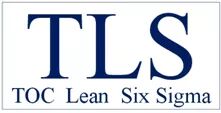Theory of Constraints, Critical Chain Project Management, Lean : industry consulting & training - Marris Consulting
T.L.S. : Concentrate on the 1% of the system that determines 99% of its performance
TLS - Theory of Constraints + Lean + Six Sigma : Combining the best of each approach
Theory Of Constraints (TOC )
- The Theory of Constraints (TOC) focuses on improving the system constraints that determine overall performance…
- …and in this way significantly boost the return on investment and success of Lean & Six Sigma programs
- Increase profits by increasing sales rather than by cutting costs and hence avoid headcount reductions
- Developed by Eliyahu Goldratt in the 1980s
Lean Manufacturing / Toyota Way
- Lean manufacturing is by far the most widespread approach in industry throughout the world
- A focus on eliminating all forms of waste
- A multi-dimensional approach: management, Just-In-Time, 5S, Lean Engineering, …
- Developed by the Toyota Motor Company in the 1950s, called “Lean” since 1990
Six Sigma
- Six Sigma reduces process variability to 3.4 defects per million occurrences
- Mostly implemented using certified experts Green Belts, Black Belts, …
- Includes a powerful tool to be used on important and complex problems (Design Of Experiments / DOE)
- Promoted by Motorola & General Electric in the 1980s.
TLS: TOC + Lean + Six Sigma
TLS (TOC + Lean + Six Sigma) was developed in 2006
TLS: a winning combination
Industrial improvement efforts over the past 20 years have been handicapped by quarrels concerning the relative merits of the different approaches and of the supposed incompatibilities or fundamental differences among them.
TLS considers, on the contrary, that we should seek to combine them thereby creating a system that contains the best aspects of each movement.
Each school of thought – Lean, Six Sigma & TOC – has proven its effectiveness, otherwise they simply wouldn’t exist.
In combination they are formidable.
Focus and Leverage: Concentrate on the 1% of the system that determines 99% of its performance
- By focusing Lean and Six Sigma activities on the constraints that directly impact global performance, the return on investment for these efforts is necessarily higher.
- This method avoids the discouragement that arises when non-constraints are improved without significant impact on global performance.
- TLS (TOC, Lean, Six Sigma) provides results that are not only significant, visible in bottom line results, but also very rapidly attained.

Dowload the article "TLS : Theory of constraints, Lean & Six Sigma"
More about the combination of Theory of Constraints, Lean and Six Sigma
Marris Consulting has over 25 years of experience in combining Theory of Constraints, Lean and Six Sigma (TLS). As performance improvement consultants, we strive to help our clients in the manufacturing and process industries reach and maintain ambitious performance levels. TLS (TOC, Six Sigma and Lean) has proven to be a highly effective approach to rapidly and sustainably improving business competitiveness. The Theory of Constraints (TOC) identifies where to act, while Lean and Six Sigma provide a wide range of efficient improvement techniques. By combining Lean, Six Sigma and Theory of Constraints, our consultants create a winning cocktail, perfectly adapted to your company's needs.
For more information about our TLS or Theory of Constraints consulting services, please do not hesitate to contact our experts.
How can TOC be combined with the Lean and Six Sigma approaches?
In practice, Theory of Constraints (TOC), Lean, and Six Sigma are largely compatible despite misconceptions. The integration of the Theory of Constraints with Six Sigma and Lean methodologies can lead to a comprehensive and powerful approach to organizational improvement.
TOC emphasizes improving the system's constraint to enhance overall performance. It complements Lean and Six Sigma programs, boosting their return on investment and success. Lean Manufacturing, known as the Toyota Way, is a prevalent industry approach encompassing various dimensions such as management, Just-In-Time, 5S, and Lean Engineering. Six Sigma aims to reduce process variability, utilizing tools like Design Of Experiments for important and complex problems.
The integration of TOC with Lean principles facilitates the identification and elimination of waste and non-value-added activities within a system. By leveraging the Theory of Constraints' emphasis on constraint management and Lean's focus on waste reduction, organizations can streamline processes, enhance flow, and improve overall operational efficiency.
The TOC with Six Sigma methodology allows organizations to emphasize the importance of continuous process improvement and defect reduction. Theory of Constraints’ focus on constraint identification and management can complement Six Sigma's data-driven approach to minimize variation and defects within processes, leading to improved product quality and customer satisfaction.
Furthermore, by integrating TOC, Lean, and Six Sigma, organizations can create a robust framework that addresses constraints, eliminates waste, reduces defects, and optimizes overall operational performance. TLS (Theory of Constraints, Six Sigma, Lean) is therefore a very powerful approach to rapidly and significantly improve an organization’s global performance.
About Marris Consulting
Marris Consulting is an industry consulting and training company specialized in the Theory of Constraints (ToC) and Critical Chain Project Management. We focus on improving the performance of manufacturing and process industries by using Constraints Management combined with Lean and Six Sigma. To boost project performance, we also use Critical Chain Project Management (CCPM), which we sometimes combine with Lean Engineering. Our 2-day performance audits, our performance consulting services and our project management, Lean, ToC & CCPM training by our industry consultants offer a wide range of solutions to help our clients around the world reach the highest possible levels of performance.


